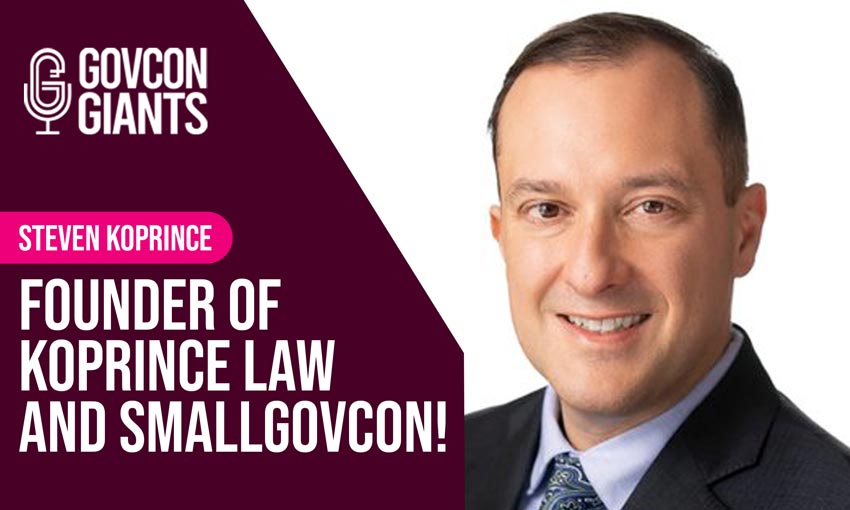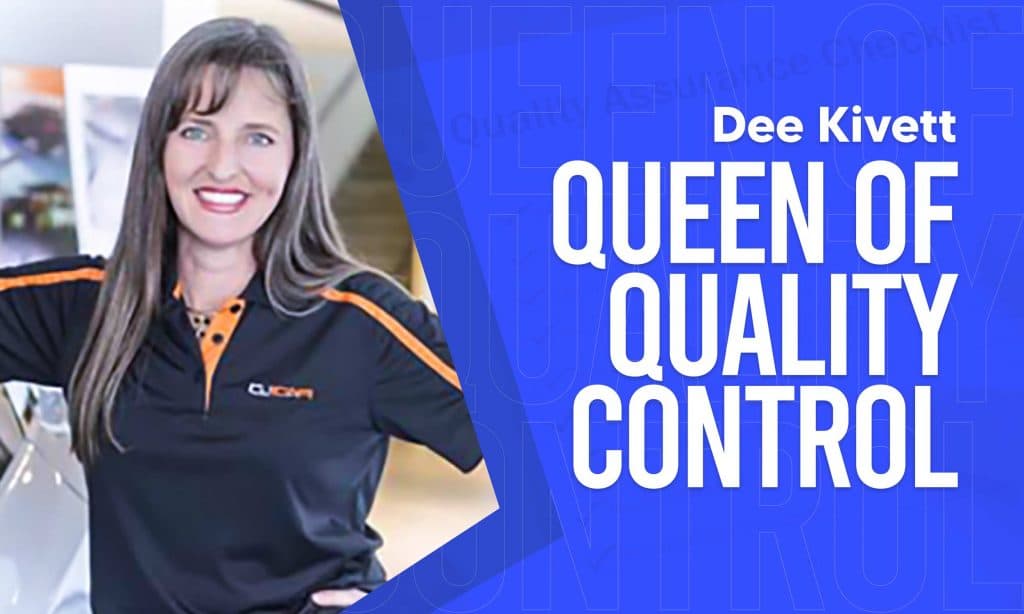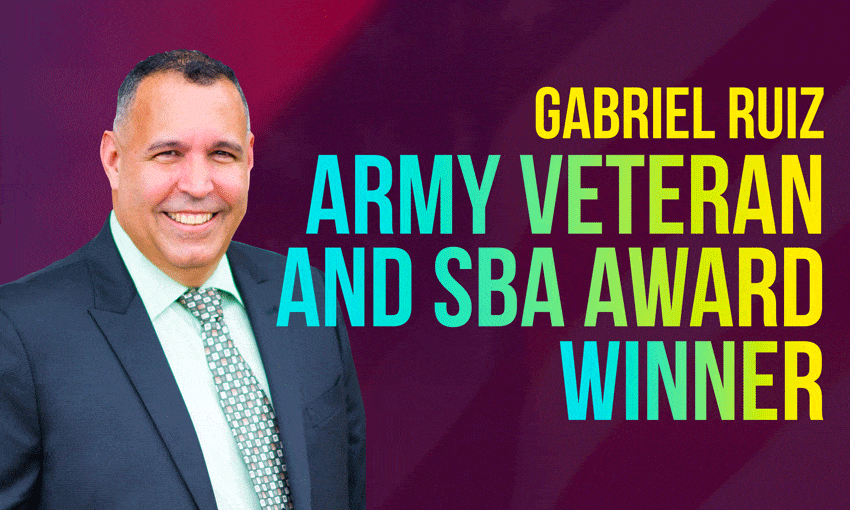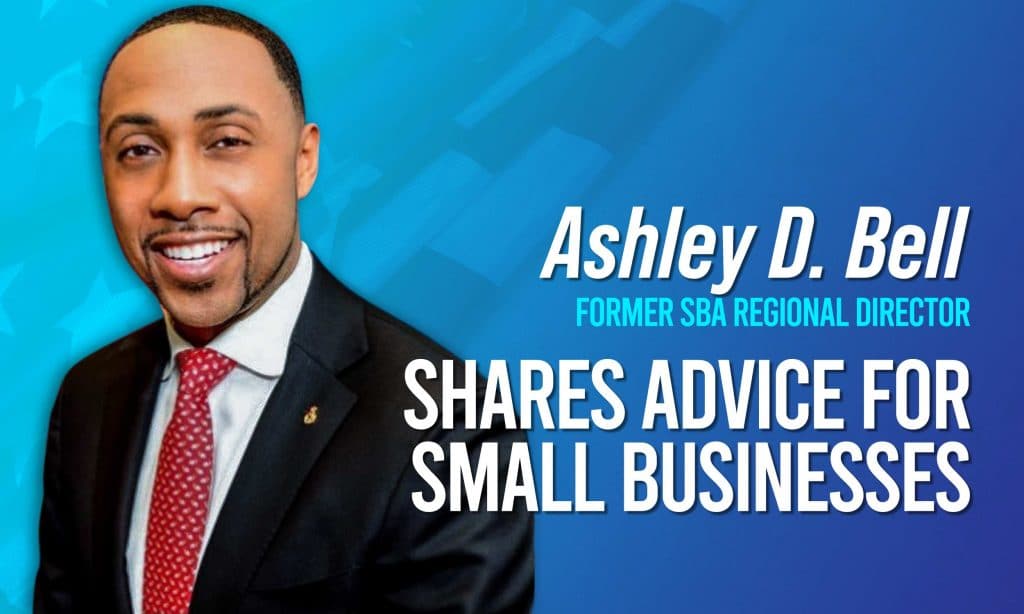Learn about government contract laws and regulations from the founder of Koprince Law and SmallGovCon, Steven Koprince!
BACKGROUND
Steven Koprince is the founder and is a Senior Partner at Koprince Law LLC, a boutique law firm providing legal solutions for government contractors.
He also founded the blog SmallGovCon where he has written over a thousand posts on government contracting legal issues.
The site is viewed by thousands of readers each month and is one of the official must read websites for learning about new rules, changing policies, and court findings in federal procurement.
Mr. Koprince is also the author of the book entitled The Small-Business Guide to Government Contracts and three GovCon Handbooks providing in-depth information on discrete government contracting topics.
Due to all of these, he appeared on numerous radio programs and podcasts and has been quoted in several national news outlets regarding different government contracting matters.
He is also a ten-time Association of Procurement Technical Assistance Centers featured speaker and was honored as a “Friend of APTAC” at the Spring 2016 APTAC National Conference.
ALL SMALL MENTOR-PROTEGE PROGRAM
In the All Small Mentor-Protege Program, any small business can team up with a mentor that is approved by the Small Business Administration (SBA).
The mentor then provides business development assistance to the protege and in return the SBA allows the mentor and the protege to form joint ventures.
What mentors get?
With this, as a mentor in a joint venture project, you’ll be getting 60% of the profits because you did 60% of the work, meanwhile the protege is getting 40% of the profits.
Apart from that, the SBA also recently confirmed that it is legal for a mentor to be getting 40% of the small business’ 40% profit because in that joint venture, you basically own 40% of their company.
Lastly, mentors can have up to three proteges at one time. Although the proteges can’t be actual competitors to one another, there’s a lot of room and opportunities out there.
What mentors should provide?
Primarily, mentors should provide business development. It is a requirement in the mentor-protege program, so that regardless if the protege gets a contract or not, they will still exit the agreement in a much better spot than when they entered.
This is why it is a must for proteges to not skip the mentor-project agreement before entering a joint venture because by doing this, the mentor has the contractual obligation to provide business development.
“Whatever it is you need to take your business to the next level, you ask your mentor to put, to do that.”
Apart from that, the mentor can also provide financial assistance, provide facilities, help in writing proposals and anything related to project management, and help the small business in developing good internal policies and procedures.
How do proteges find mentors?
Most primes want to mentor businesses that they have a past relationship with and not just someone who goes straight and asks them, “Hello, be my mentor.”
So, the best thing to do is be a subcontractor to them. All these large businesses have subcontracting plans and they need subcontractors with different socioeconomic certifications.
If you see a contract coming up that they’re bidding and that you could be useful to, let them know. You will then be included on their team and you can start working together and soon build a relationship.
THE THREE-IN-TWO RULE
The three-in-two rule was a restriction on joint venture entities. In this rule, it said that within a two-year window period, you are only restricted to get three contracts.
Then, after you get your third contract, you can either stop working with your partner or mentor or you form a new joint venture and resets the clock to zero.
However, this is where it gets more frustrating because when you continue bidding under that old joint venture and you exceed the three contracts, the size of your partner will then be added to yours, so you now can’t go after small business set-asides.
And if you build another joint venture, you will still be subject to the three-in-two rule which means that if you reach the three maximum contracts, you need to build another joint venture.
Fortunately, the three-in-two rule was recently changed where they get rid of the three parts.
Now, in this new rule, the two rule, joint ventures can already win as many contracts as they want between the two-year period.
Still, consider that the two-year period is still there and if you continue bidding after that period with the same joint ventures, then you will be found affiliated with that and could get in trouble.
SMALL BUSINESS SIZE STANDARDS
In the old small business size standard, small businesses were determined based on the number of employees or dollar amount of revenues from a three-year average.
However, the Congress made some changes and on December 17, 2018, the Small Business Runway Extension Act of 2018 was signed into law.
With this new modification, small businesses are now determined based on a 5-year average.
HUBZONE PROGRAM
In recent years, the government wasn’t able to reach its goal for the HUZone Program. This may be due to structural issues that are imposed in the program that affects disadvantaged businesses in HUBZone areas.
One of the structural issues has been its 35 percent requirement wherein HUBZone companies should have 35% of its employees living in a HUBZone area.
This is certainly a problem because this requirement must be met when these businesses apply in the program and during both the bid date and award date of a contract.
Another problem is that if one of these employees living in a HUBZone move to another place or quits the job, then you will be removed from the program.
Fortunately, there are positive changes that the government made for HUBZone companies.
Now, you don’t have to maintain the 35% requirement within a contract’s bid date and award date, as long as you meet it on the date of your certification and you will do an annual renewal afterwards.
Then, the government also made it for you to do joint ventures as they get rid of the requirement that you can only do this with another HUBZone company. Now, you can do joint ventures with a mentor, like any program.
OTHER THINGS TO CONSIDER
1. Don’t do something that is not written in your contract.
Many folks believed that everyone in a contract or a project who carries a government business card can essentially tell you to do more work or change your work, but it is not.
Only the contracting officer can do these changes as they are the ones who have the authority in that contract.
For instance, if you are doing a landscape project and the project manager asks you to do something else, then you should not agree to it, unless the contracting officer made the changes in the contract and added what the project manager asked.
But what happens if you do it, will you get paid? In some cases, you will be paid through ratification, but this is optional and it depends on the people in that agency. This is why you should protect yourself from these instances.
2. Update your SAM profile before you submit a bid.
It’s a common misconception that you only need to update your SAM profile once a year, but this information is false.
In fact, the FAR says that any time you bid on a government contract, your reps and certs in SAM should be current, accurate, and complete, as of that date.
So, one year is the minimum of making changes. If nothing has changed or you didn’t bid in anything, you still have to update it once a year.
However, if anything changes in those reps and certs and every time you submit a bid, you need to update it, otherwise you’re making a false certification towards the government.
3. 1099ers are subcontractors, not employees.
1099 independent contractors are subcontractors. This doesn’t mean that you need to give them your subcontracts to companies, but you can call it an independent contractor agreement that hereby incorporates all the FAR clauses.
You can’t also call them 1099 employees. You either classify them as 1099 or your employees. You can’t have it both ways.
Besides, you can’t tell the IRS that they are a 1099 while also telling SAM that they’re an employee when you want that to be true.
However, if you call them employees, then you better be paying all of your unemployment taxes and other stuff, otherwise you’re committing tax fraud.
RESOURCES
If you want to learn more about government contract laws and regulations from Steven Koprince, then be sure to click the resources below. You can also visit the GovCon Giant website or the new GovCon Edu where you learn everything about government contracting!
81: A Guest That Needs NO Introduction… Mr. Koprince of Koprince Law
https://govcongiants1.wpengine.com/podcast/081/
https://www.youtube.com/watch?v=9QelKtX7HKk









